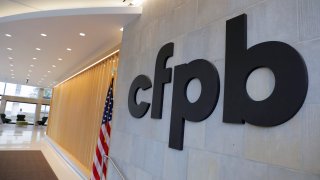
- The Consumer Financial Protection Bureau has proposed a new rule to ban excessive credit card late fees.
- Congress banned excessive fees in 2009, but the Federal Reserve Board of Governors issued actions to circumvent the law, the CFPB said.
- The new rule will reduce excessive late fees by as much as $9 billion per year, according to the agency.
WASHINGTON — The federal government's consumer protection watchdog proposed a new rule on Wednesday to ban excessive credit card late fees, potentially reducing them by as much as $9 billion per year.
Congress banned exorbitant credit card fees under the Credit CARD Act in 2009, but an immunity provision instituted by the Federal Reserve Board of Governors enabled card companies to dodge enforcement standards, said Rohit Chopra, director of the Consumer Financial Protection Bureau.
"Over a decade ago, Congress banned excessive credit card late fees, but companies have exploited a regulatory loophole that has allowed them to escape scrutiny for charging an otherwise illegal junk fee," Chopra said. "Today's proposed rule seeks to save families billions of dollars and ensure the credit card market is fair and competitive."
Feeling out of the loop? We'll catch you up on the Chicago news you need to know. Sign up for the weekly Chicago Catch-Up newsletter here.
The proposal follows a March 2022 report that showed credit card issuers charged consumers $12 billion in late fees in 2020. Many issuers charge the maximum late fee outlined by the Fed Board in 2010: $30 for the first late payment and $41 for subsequent late payments within six billing cycles. Card issuers that hike fees with inflation are also protected by immunity clauses, according to Chopra.
The CFPB rule proposed Wednesday would lower the amount consumers can owe for late payments to $8 from as much as $41, end the automatic annual inflation adjustment for the provision and cap late fees at 25% of the minimum payment owed by the cardholder.
Chopra said credit card issuers have made late penalty fees "a core part of their profit model," and that protections offered by the Credit CARD Act effectively reduced the total cost of credit for consumers. The fees disproportionately affect households living paycheck-to-paycheck, borrowers living in America's poorest neighborhoods, areas where the population is mostly Black as well as subprime and private label cardholders.
Money Report
"Markets work best when companies compete on price and service, rather than relying on back-end fees that obscure the true cost," Chopra said. "Given their current practices, we expect that credit card issuers will hike fees, based on inflation, as limits continue to rise."
Some banking interest groups panned the proposal Wednesday, saying it will increase costs, reduce credit options for consumers and potentially restrict access to credit in local communities.
"By effectively removing those incentives, the proposal would harm the very consumers the CFPB seeks to protect by increasing the overall cost, and reducing the availability, of credit," said Paige Pidano Paridon, senior vice president and senior associate general counsel of the Bank Policy Institute, which advocates for mid-to-large size banks.
Rebeca Romero Rainey, CEO of the Independent Community Bankers of America, cautioned the CFPB to solicit feedback from small financial institutions during the decision-making process.
The U.S. Chamber of Commerce, the nation's largest business advocacy group, also said the rule proposal would punish responsible consumers.
"Late fees not only ensure prompt repayment but also help consumers avoid additional interest accruing on unpaid balances and establish good credit history," said Bill Hulse, vice president of the Chamber's Center for Capital Markets Competitiveness. "Ultimately, what the American credit card user can expect from this rule change is higher costs and reduced choices as a direct result of the CFPB imposing more red tape on businesses."
But the American Economic Liberties Project, an anti-monopoly organization, lauded the CFPB for standing up to credit card companies.
"For too long, credit card companies have cashed in on evading the 2009 CARD Act, turning huge profits by slapping consumers with unreasonable and disproportionate fees that often charge up to five times the costs associated with collecting late payments," said Shahid Naeem, an AELP policy analyst. "The CFPB's fight against rip-off junk fees is a clear demonstration of the ways strong regulators can protect Americans from the corporate giants taking advantage of them."
The CFPB will seek public comment on other potential changes, including whether to make the proposed rule apply to all credit card penalties, eliminate the immunity provision altogether, create a 15-day courtesy period for credit card holders before the assessment of late fees and require credit card companies to offer autopay services as a condition of immunity provisions.
The rule change also follows a request for comment on the Biden administration's initiative to reduce certain "junk fees" burdening American consumers.
Late fees cost American families around $12 billion a year in addition to billions in interest, the CFPB said.
The Fed Board declined to comment.
The group argued the fees should encourage consumers to pay their bills on time.






